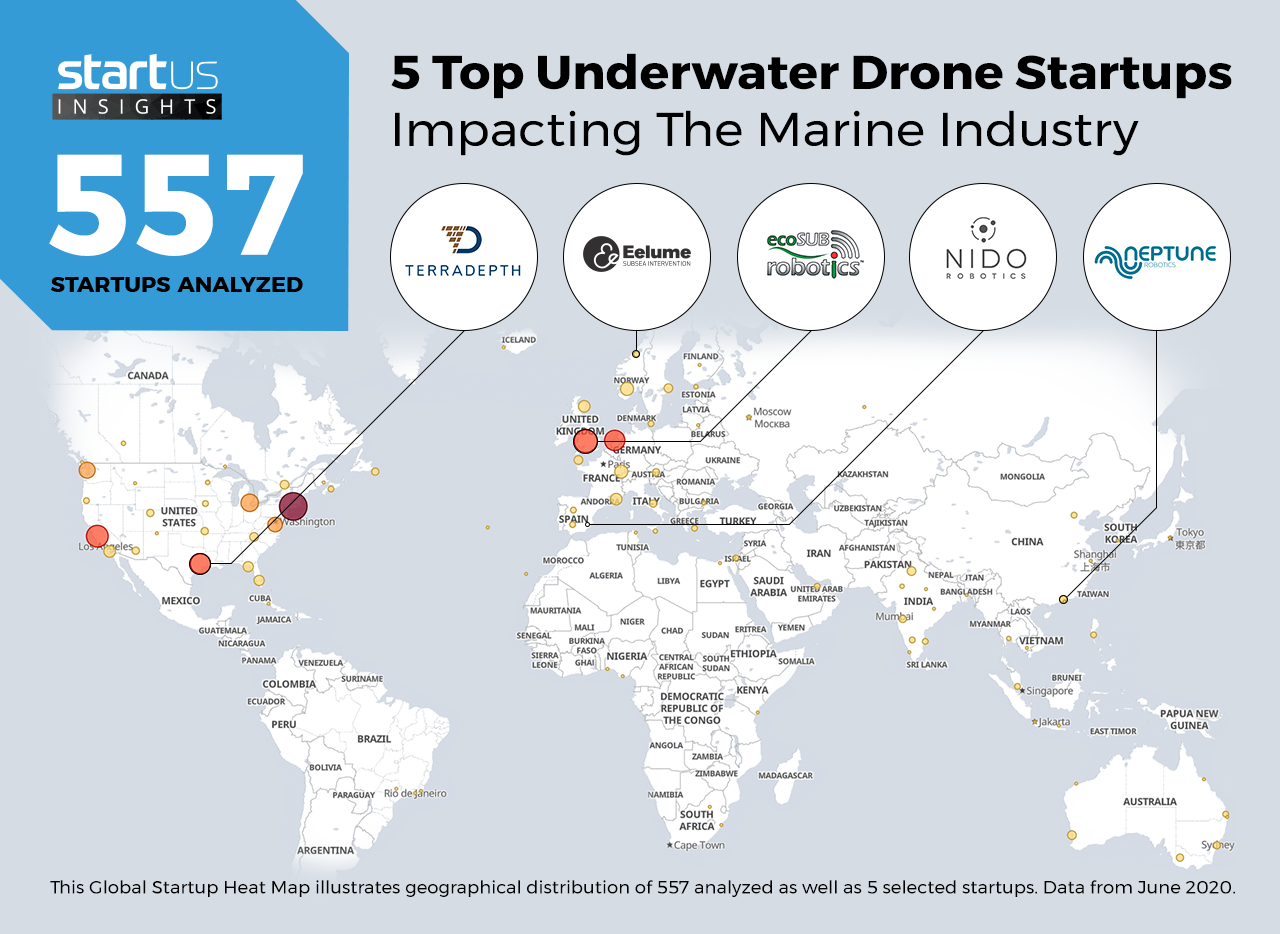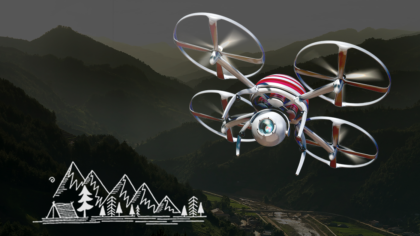Accelerate Productivity in 2025
Reignite Growth Despite the Global Slowdown
Our Innovation Analysts recently looked into emerging technologies and up-and-coming startups working on drone solutions for the marine sector. As there is a large number of startups working on a wide variety of solutions, we decided to share our insights with you. This time, we are taking a look at 5 promising underwater drone startups.
Heat Map: 5 Top Underwater Drone Startups
Using our StartUs Insights Platform, covering 1.116.000+ startups & emerging companies, we looked at innovation in the field of drones. For this research, we identified 557 relevant solutions and picked 5 to showcase below. These companies were chosen based on a data-driven startup scouting approach, taking into account factors such as location, founding year, and technology among others. Depending on your specific criteria, the top picks might look entirely different.
The Global Startup Heat Map below highlights 5 startups & emerging companies developing innovative underwater drones. Moreover, the Heat Map reveals regions that observe a high startup activity and illustrates the geographic distribution of all 557 companies we analyzed for this specific topic.
Terradepth – Underwater Data Collecting Operations
Collecting data from water and marine ecosystems poses significant challenges for humans. Drones help alleviate the challenges regarding safety, efficiency, and talent. Depending on the task at hand, drones with different capabilities need to be ready for deployment. As a result, we observe emerging companies develop drones with a specific task in mind, for example, monitoring or inspection of off-shore assets.
The US-based startup Terradepth develops autonomous surface and subsurface vehicles by employing a patent-pending operating concept. Their solution deploys two or more vehicles for the collection of underwater data. A surface vehicle provides data collection, communications, and navigation assistance, while other submerged vehicles conduct their specific tasks. The two, or more, vehicles later switch roles once the submerged vehicle’s energy is near exhausted. These vehicles employ a hybrid system of rechargeable lithium batteries and an air-dependent power plant capable of operating high payloads.
ecoSUB Robotics – Low-Cost Autonomous Underwater Vehicles (AUVs)
There is a growing number of applications that require data from below the surface of the ocean. From environmental research and climate studies to military and oil & gas inspections, there exists a range of underwater drones. However, for many, using AUVs remains expensive and so they look for cheaper alternatives, like sending in humans. As a result, startups find innovative ways to provide and expand access to underwater drone-based data.
British startup ecoSUB Robotics develops a range of advanced low-cost AUV technology. To reduce the barriers to autonomous system use in the underwater environment, they offer three AUVs. Their micro-AUVs are capable of traveling 500 meters underwater, while the small-AUVs are built with a range of 500 meters to 2500 meters. Also, the startup offers a graphical user interface (GUI) and a central command unit. These AUVs use network localization and advanced navigation systems to accurately conduct their tasks.
Eelume AS – Subsea Inspection, Monitoring & Repair (IMR)
The oil & gas industry is also utilizing advanced underwater drones for improving IMR tasks for subsea infrastructure. Conventional underwater vehicles still lack the capacity to access all parts of subsea assets, requiring further resources to complete the tasks. Sometimes, losses are accounted for even before commencing inspections, leaving the assets vulnerable to damage. In response, startups combine drone technology with advanced robotics to solve tough challenges in the oil & gas sector.
Norwegian startup Eelume AS develops autonomous advanced subsea IMR vehicles. Eelume vehicles are self-propelling robotic arms with a flexible body that transits over long distances to carry out IMR in confined spaces. These vehicles are engineered to live permanently underwater, allowing for a continuous IMR capability near the subsea installations, without the need for surface vessels. As a consequence, the startup enables greener, safer, and less expensive subsea operations.
Nido Robotics – Underwater Remotely-Operated Vehicles (ROVs)
One major reason for the advancements in underwater drone technologies is the expanding scope of marine and water-based industries. From improving aquaculture farms to deep-sea exploration, there is a growing demand for underwater ROVs as it eliminates the need to risk human life. With ROVs becoming more durable, they are also capable of incorporating different sensors like sonar, temperature, pressure, and video. This enables water-based industries to become efficient and eliminate the practices currently in use, which harm the environment.
Spanish startup Nido Robotics manufactures underwater drones that perform the inspection, maintenance, or research efficiently, at competitive prices, and without putting human lives at risk. They offer the Sibiu Pro and Sibiu Nano, both of which are equipped with full HD cameras and last for about 2 hours. The underwater ROVs conduct investigation, maintenance, security, and inspection tasks for a wide range of industries. As manufacturers, they also offer custom solutions depending on their client’s requirements.
Neptune Robotics – Robotic Operations At Ports
Marine or maritime logistics already offer higher fuel efficiency in comparison to the road or air logistics. However, the sector still faces challenges, especially regarding human safety and ecosystem preservation. In recent years, the size of the average shipping vessel has significantly increased. This creates opportunities for emerging companies to develop advanced robotic solutions for managing large ships at crowded ports.
Chinese startup Neptune Robotics offers robotic inspection and cleaning solutions for ships, when they are loading or unloading, at berth or anchorage. The startup develops a debris collection and filtration system that reduces carbon dioxide (CO2) emissions. Additionally, their technology prevents the spread of invasive species that may have attached to the hull of the ship during transit. Their proprietary underwater ROVs and AI-enabled digital solutions attend ships at several ports across China.
What About The Other 552 Solutions?
While we believe data is key to creating insights it can be easy to be overwhelmed by it. Our ambition is to create a comprehensive overview and provide actionable innovation intelligence so you can achieve your goals faster. The 5 underwater drone startups showcased above are promising examples out of 557 we analyzed for this article. To identify the most relevant solutions based on your specific criteria, get in touch.








